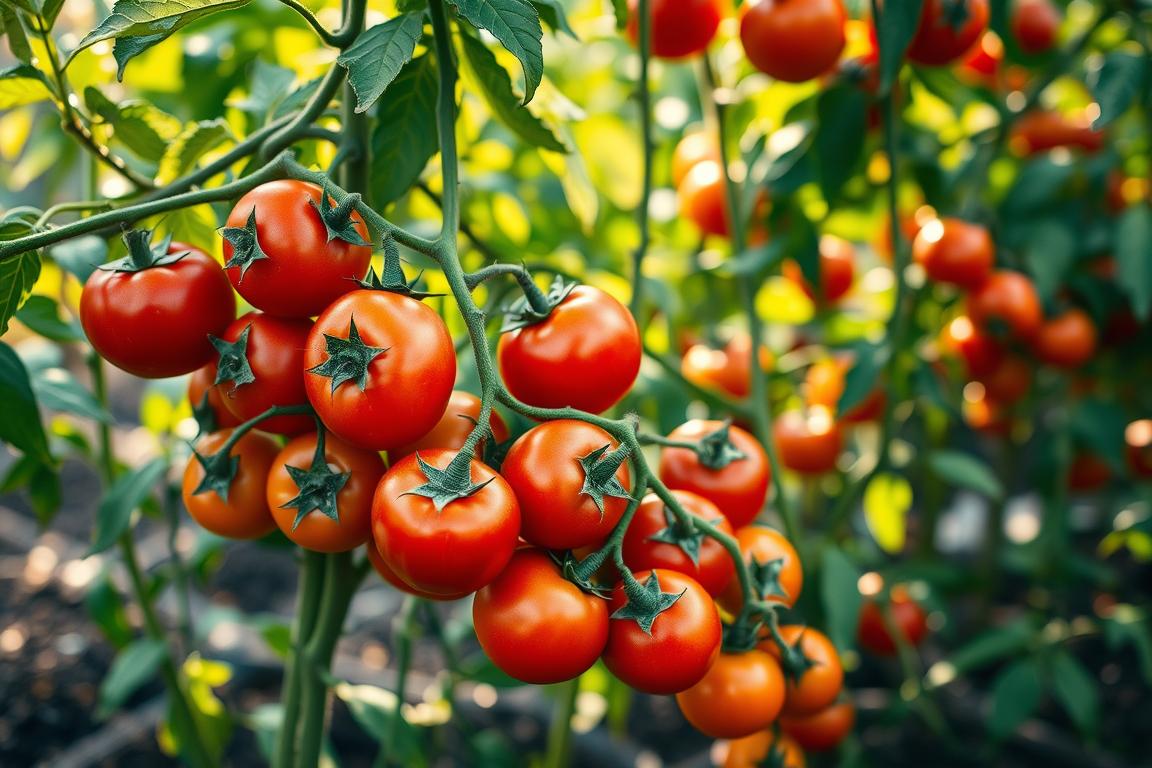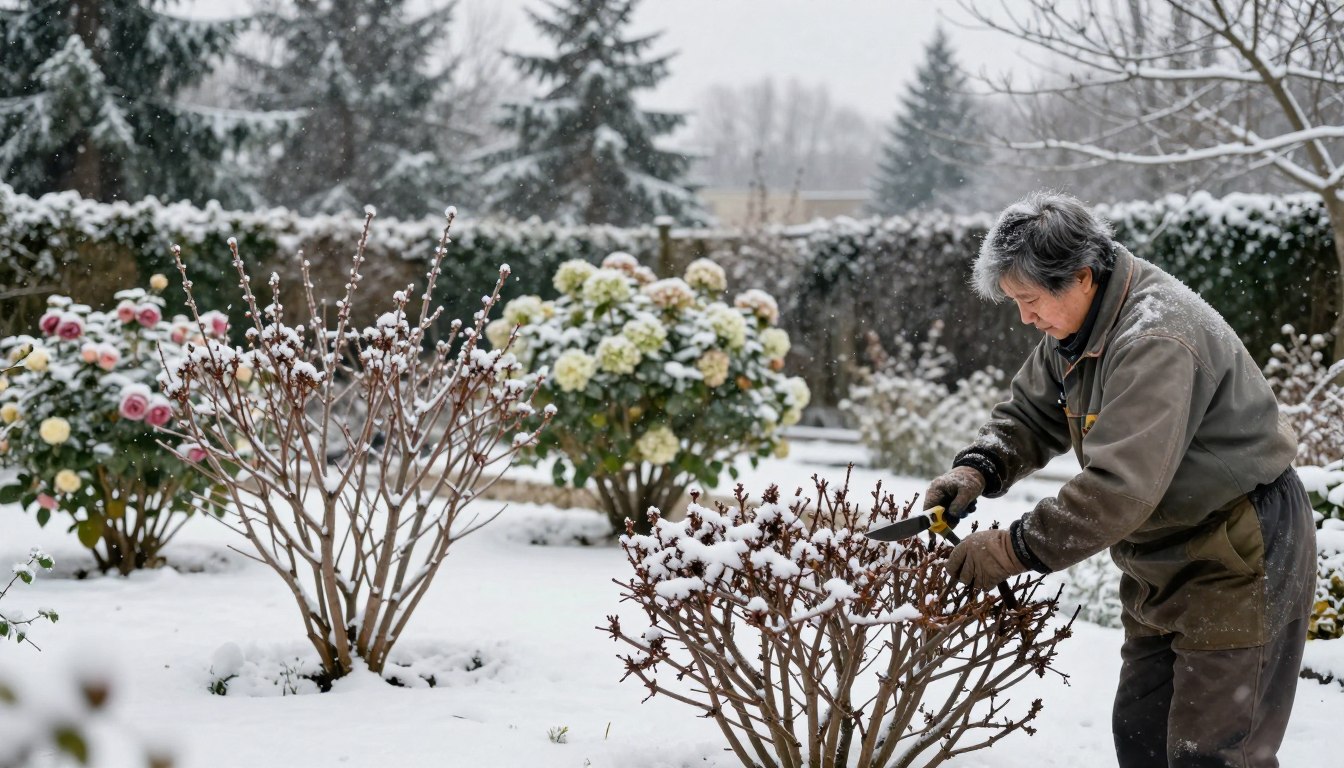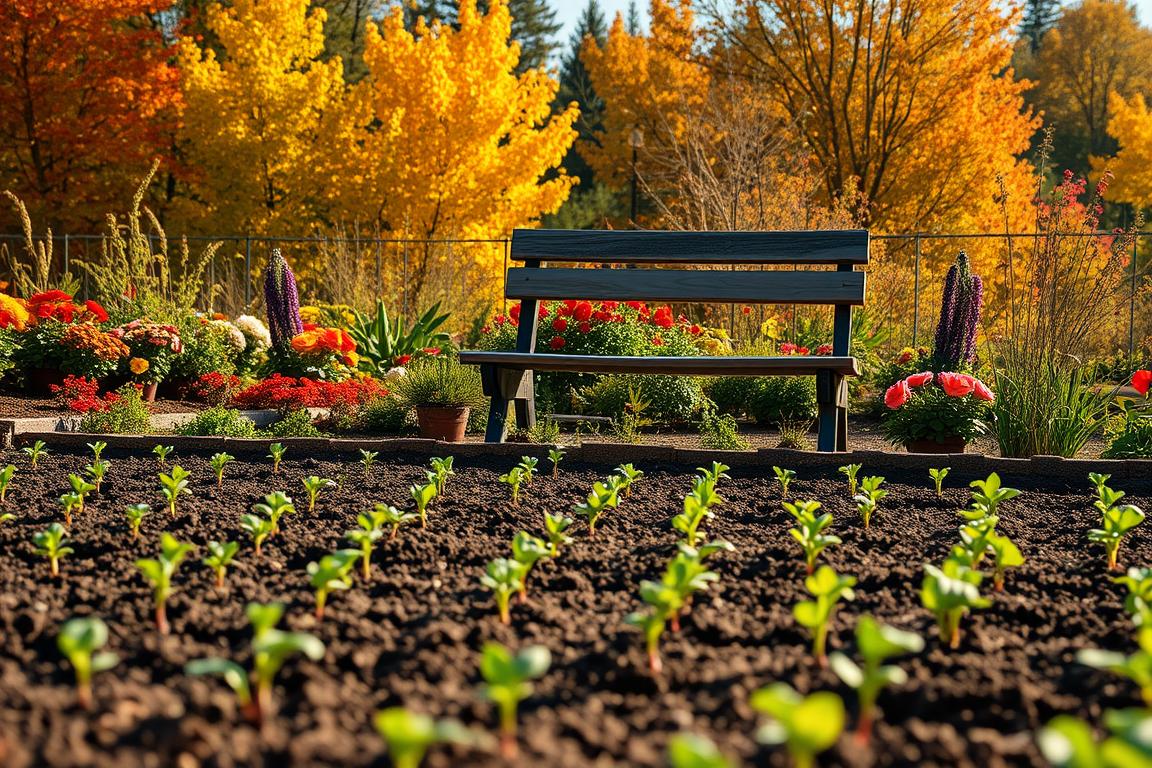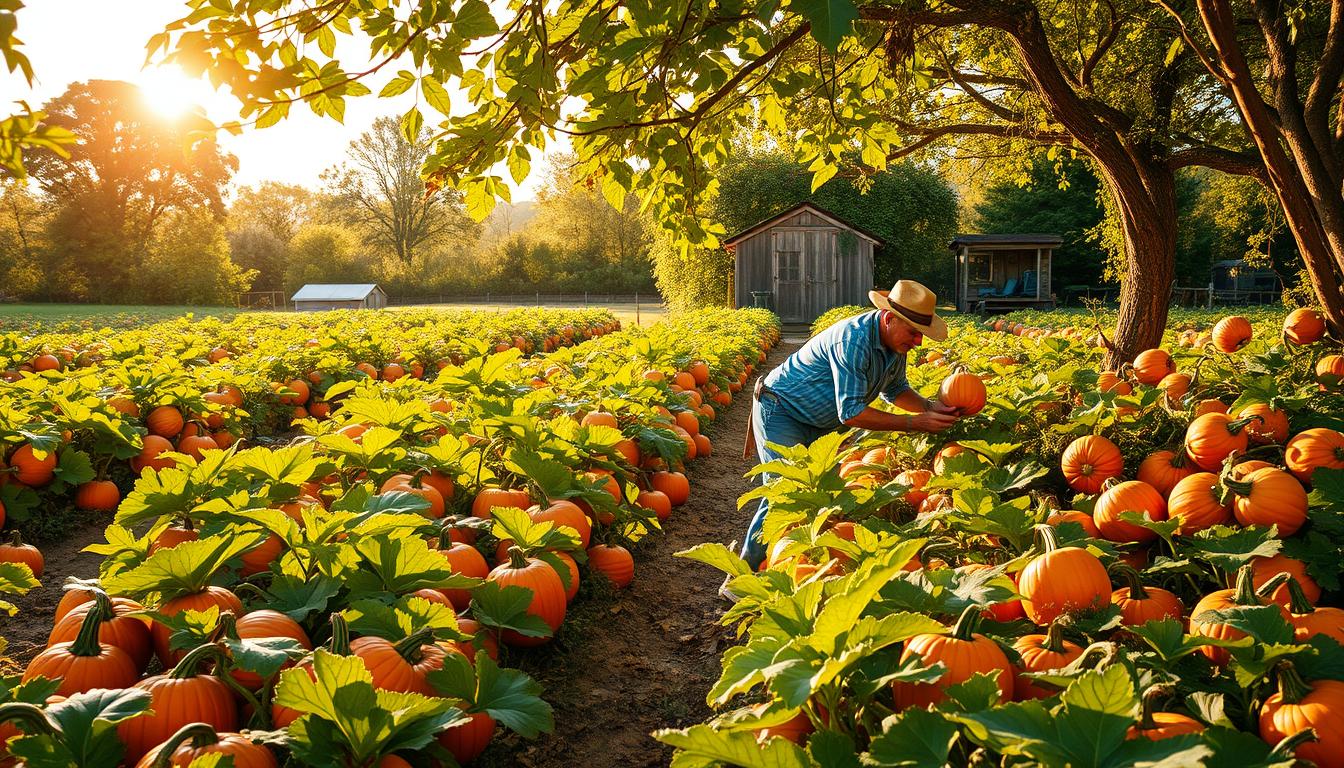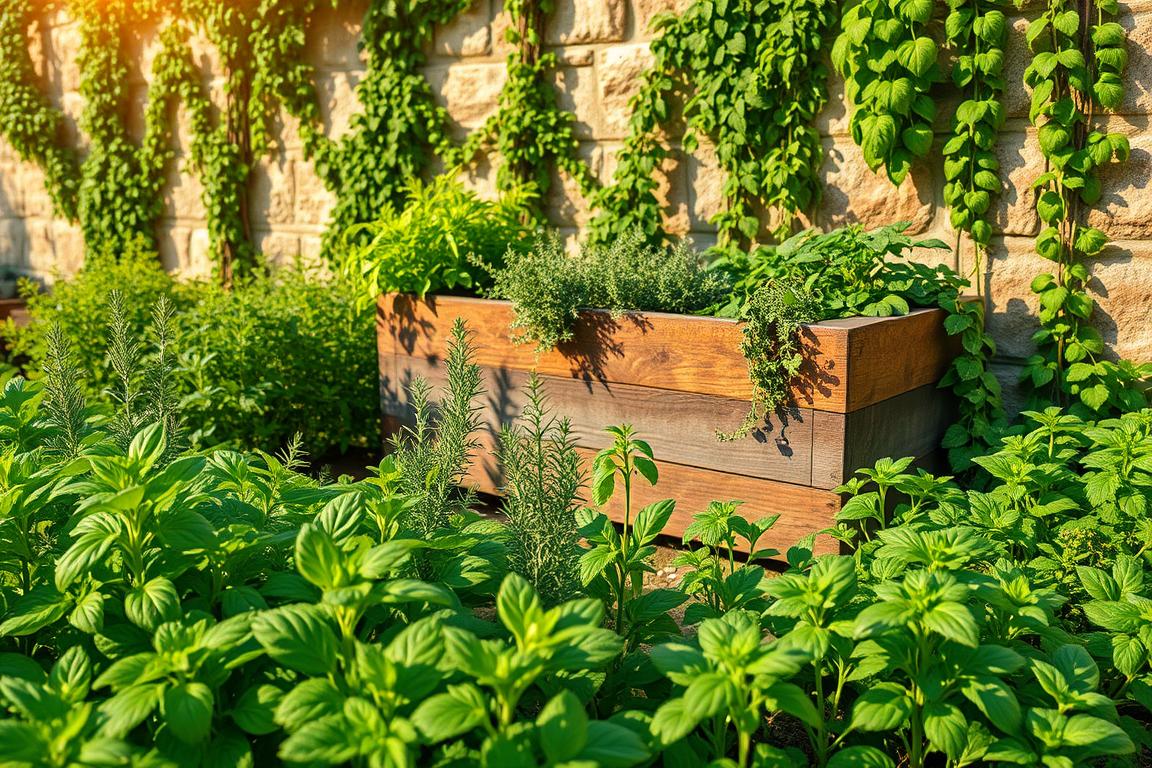Did you know homegrown tomatoes can have up to ten times more flavor than store-bought ones? The joy of picking a ripe tomato from your garden is unmatched. I’ll guide you through growing tomatoes, from picking the right variety to caring for them.
With these tips, your garden will become a vibrant spot for juicy tomatoes. You’ll be ready for any recipe that calls for fresh tomatoes.
Key Takeaways
- USDA data shows homegrown tomatoes can be significantly more flavorful.
- Proper variety selection is crucial for a successful tomato garden.
- A backyard garden provides fresh and healthy tomatoes.
- Timing and location play critical roles in tomato growth.
- With attention, your homegrown tomatoes can thrive and yield a bountiful harvest.
Choosing the Best Tomato Varieties for Your Garden
Choosing the right tomato varieties is key for a successful garden. Knowing the differences helps me make the best choices. I’ll look at determinate and indeterminate types, and the unique qualities of heirloom and hybrid tomatoes.
Determinate vs. Indeterminate Tomatoes
Determinate tomatoes grow compactly and produce all their fruit at once. They’re great for small spaces or containers. They’re also easier to manage because of their predictable growth.
Indeterminate tomatoes, on the other hand, keep growing and producing fruit all season. They need more support, but the ongoing harvest is worth it.
Heirloom vs. Hybrid Tomatoes
Heirloom tomatoes bring history and unique flavors to my garden. They’ve been passed down for generations, offering amazing taste and texture. Hybrid tomatoes, bred for traits like disease resistance, are more reliable but often lack the heirloom’s flavor.
I like to grow a mix of both for a varied and tasty harvest.
Popular Tomato Varieties
I enjoy trying different tomato types to find my favorites. Some top picks include:
- Cherry tomatoes: Perfect for snacking or adding to salads.
- Plum tomatoes: Great for sauces because of their meaty texture.
- Vine-ripened tomatoes: Known for their rich flavor, perfect for sandwiches and salads.
By choosing varieties that match my preferences, I get a rewarding garden and a delicious harvest.
When and Where to Plant Your Juicy Tomatoes
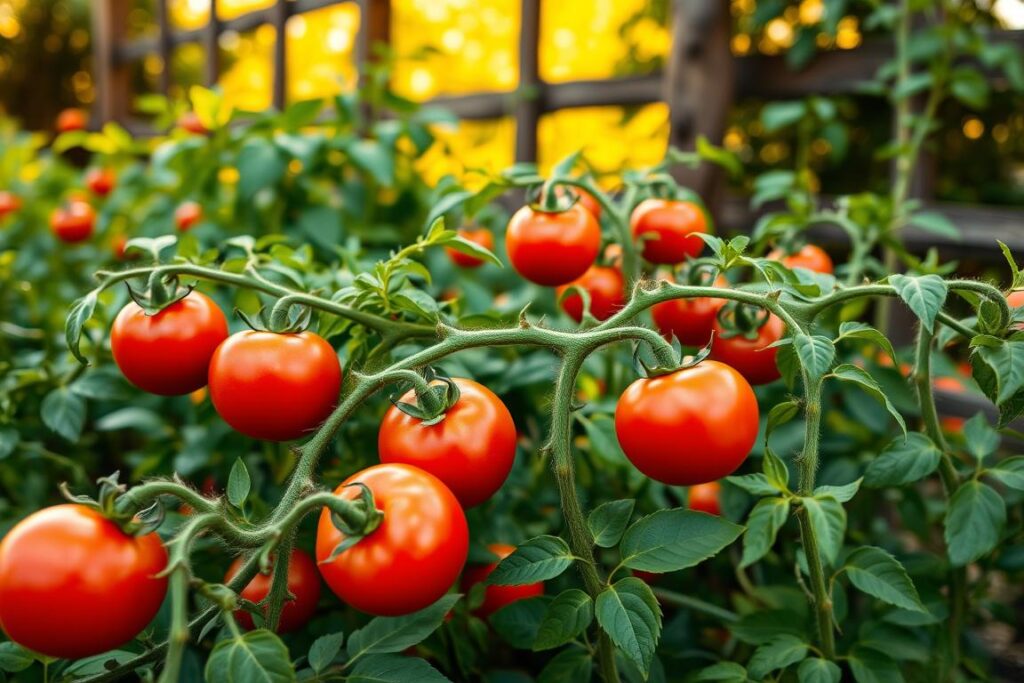
Timing and location are key to growing juicy tomatoes. Planning ahead helps me enjoy a full harvest. I must think about frost dates and other factors for the best spot for my plants.
Timing Your Planting for Optimal Growth
Plant tomatoes after the last frost to protect young plants. Soil temperatures over 50°F (10°C) are perfect for planting. Watching frost dates closely is important. Local gardening calendars can guide me on the best time.
Choosing the Perfect Location
Choosing the right garden spot is crucial. Tomatoes need 6-8 hours of sunlight a day. This sunlight helps them grow and ripen well. Also, the soil must drain well and have the right pH for juicy tomatoes.
Growing Juicy Tomatoes from Seeds
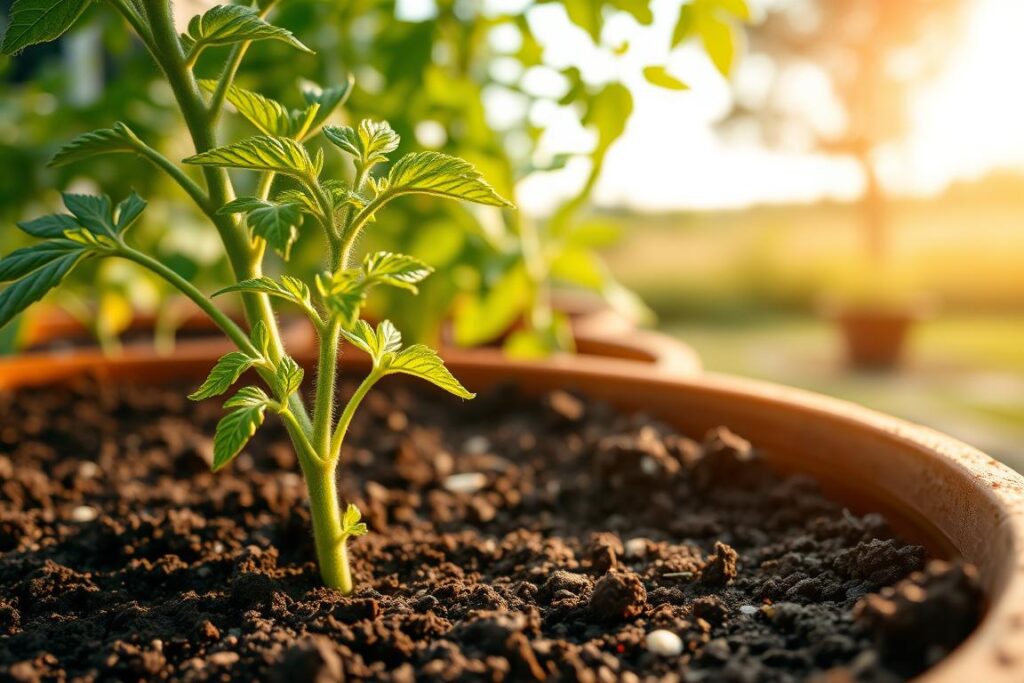
Growing tomatoes from seeds is a fun journey. It lets me grow my favorite juicy tomatoes at home. First, I need to get the right stuff, like good seed starting mix, trays, and a spray bottle for watering.
Starting seeds indoors 6-8 weeks before the last frost is key. It helps my tomato seedlings grow strong.
Step-by-Step Guide to Seed Germination
Seed germination is easy to follow:
- Fill trays with seed starting mix, lightly pressing it down.
- Plant seeds at the right depth for each type.
- Moisten the mix with the spray bottle for the right moisture.
- Cover trays with plastic to keep warmth and humidity in.
- Keep trays warm, around 70-75°F (21-24°C).
- Take off the cover when seedlings appear, usually in 7-14 days.
- Give them lots of light with grow lights or a sunny window.
Direct Sowing vs. Transplanting
When my tomato seedlings are ready, I choose between transplanting or direct sowing. Each has its own benefits:
| Method | Advantages | Considerations |
|---|---|---|
| Transplanting | Starts them off early; helps with plant care. | Needs extra care before planting outside. |
| Direct Sowing | Is easier; needs less care at first. | May not germinate well if conditions are bad. |
Knowing how to germinate seeds and transplant is key to a great tomato harvest.
Planting and Caring for Your Tomato Plants
When my tomato seedlings are ready, I focus on the best planting techniques. This ensures they grow strong and healthy. It also helps them produce juicy tomatoes later.
How to Plant Tomato Seedlings
I prefer deep planting for tomato seedlings. Planting them deeper than their pot helps their roots grow. Before planting, I add organic soil amendments like compost or manure. These improve the soil and help the plants grow well.
Watering and Fertilizing
Watering the right amount is key. I water my tomatoes deeply once a week, which is important in hot weather. This encourages deep root growth and helps them find moisture. I also use a balanced fertilizer for tomatoes to give them the nutrients they need.
Mulching and Pest Management
To keep the soil moist and reduce weeds, I use organic mulch. It keeps the soil temperature steady and prevents moisture loss. I also check my plants often and use natural pest control when needed. This protects my tomato seedlings from pests.
| Care Aspect | Best Practices |
|---|---|
| Planting Depth | Deep planting to encourage root development |
| Soil Amendments | Organic compost or well-rotted manure for nutrient boost |
| Watering Frequency | Deep soak once a week |
| Fertilizing | Use tomato-specific balanced fertilizer |
| Mulching | Organic mulch to retain moisture and suppress weeds |
| Pest Management | Regular inspections and natural deterrents |
By following these steps, I create the perfect environment for my tomato plants. This way, I can enjoy delicious, juicy tomatoes.
Harvesting Your Juicy Tomatoes
Choosing the right time to pick tomatoes is key to enjoying their full flavor. When tomatoes turn vibrant, it’s time to pick them. Each variety shows ripeness differently, but firmness and color are common signs.
I carefully twist or snip ripe tomatoes from the vine. This way, I avoid damaging the plant. Picking tomatoes at their peak ripeness ensures they are sweet and flavorful. Freshly picked tomatoes can make any dish better, whether for a snack or in a recipe.
Conclusion
Growing juicy tomatoes is both rewarding and enriching. Backyard gardening lets me cultivate these delightful fruits. It also deepens my appreciation for the labor that goes into tomato cultivation.
By choosing the right varieties and understanding their care needs, I’ve made my garden vibrant. It’s a source of flavor and nutrition.
The joy of harvesting my own tomatoes is unmatched. They become the star of my tomato recipes. Whether it’s a fresh salsa or a comforting pasta sauce, homegrown tomatoes make every dish better.
The process of planting, caring for my plants, and harvesting has connected me to nature. I didn’t expect this.
So, I encourage everyone to try growing tomatoes in their gardens. The rewards are worth the effort. Soon, you’ll enjoy the fruits of your labor too.
Let’s make the most of our backyards. Enjoy the wonderful world of fresh, juicy tomatoes.
FAQ
Q: How do I choose the best tomato variety for my garden?
A: Pick a tomato variety that fits your needs. Do you want sweet cherry tomatoes for snacks, flavorful heirlooms for salads, or juicy plum tomatoes for sauces? Think about whether you need determinate or indeterminate types. This depends on your growing space and how long you want to harvest.
Q: When is the best time to plant tomatoes?
A: Plant tomatoes after the last frost, when soil is over 50°F (10°C). Plant them in late spring or early summer for the best growth.
Q: What is the difference between growing tomatoes from seeds and buying seedlings?
A: Growing from seeds is cheaper and lets you choose more varieties. Buying seedlings is quicker but more expensive. Seeds can grow into healthier, stronger plants that fit your garden better.
Q: How should I care for my tomato plants after planting?
A: Water your tomato plants deeply once a week. Use organic fertilizers and add soil amendments. Mulch to keep moisture in and watch out for pests to keep your plants healthy.
Q: How can I determine when my tomatoes are ready to be harvested?
A: Tomatoes are ripe when they’re bright in color and slightly soft. Twist or cut them gently to get the best taste and flavor.
Q: What are some popular tomato recipes I can try?
A: There are many tomato recipes to try! Make a fresh tomato salad, a tasty tomato pasta, or a rich sauce. Enjoy your juicy tomatoes in many dishes!
Q: Are there health benefits to eating tomatoes?
A: Yes, tomatoes are full of vitamins C and K, potassium, and antioxidants like lycopene. They’re good for your heart and may lower disease risk. Eating tomatoes is a tasty way to get more nutrients!


